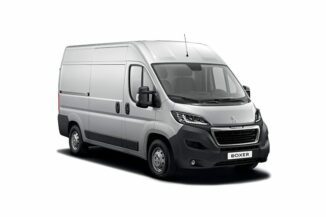Starting a new limited company (Ltd) can feel like your dreams are coming true, and when it comes to getting a van or fleet of vans to support your operations, leasing can be an attractive option offering several advantages. However, you’ll probably wonder: Can I lease a van with a new limited company? In short, the answer is yes. In this article, we’ll explore the essentials you need to know and consider when leasing a van for your newly established business.
How does a business van lease work?
A limited company van lease refers to an arrangement where your business rents a van or a pick-up truck for a fixed period instead of buying it outright. Commercial vehicle lease typically lasts 2-5 years and involves fixed monthly payments for the use of the van during this period. The most important here is that the company does not own the van once the lease contract comes to an end.
During the leasing process, you’ll be required to estimate your annual mileage. This becomes your mileage allowance for the lease term. At the start of a lease contract, you also have to make an initial payment (often called a deposit). This is often equivalent to 3, 6, 9, or 12 monthly vehicle rentals (payments). For example, if a new vehicle has a monthly rental cost of £250, choosing to pay the equivalent of six monthly rentals as the initial rental would cost you £1,500 in the first month, followed by monthly payments of £250 for the remainder of the lease term. It’s worth adding that the higher the deposit, the lower your monthly lease payments and vice versa.
Buy or lease? – The benefits of leasing a van for business
Before delving further into company van leasing, let’s consider why opting for this specific form of van finance can be an excellent decision for your new business.

- Low upfront cost: Leasing offers a cost-effective option for limited companies. By avoiding the large upfront cost of buying a van outright, you can save your funds for business growth and other essential expenses.
- Affordability: When you choose to lease a van, there is no need to borrow the entire value of the vehicle. This is because you are only paying for using the van for a specific duration. As a result, your monthly installments are typically lower than if you purchased the van on finance. Furthermore, the lower borrowing amount increases the chances of securing finance approval, even for limited companies that are relatively new.
- Tax benefits: Lease payments typically qualify for tax deductions. As a result, your company’s taxable income and tax liabilities will typically be reduced. Furthermore, you can reclaim 100% VAT paid on the van lease.
- Flexibility: Leasing lets you upgrade your business vehicle at the end of the term. This enables you to adapt to your evolving needs as your company grows.
- Various finance options: The growing popularity of van leasing has resulted in a broader range of financing options available for limited companies. Companies such as Commercial Vehicle Contracts collaborate with multiple lenders to provide a wide selection of choices.
- Warranty: Leased vans typically come with a manufacturer’s warranty.
- No depreciation worries: As you don’t own the van, you don’t have to stress about your valuable asset losing its value.
If you’re still uncertain about whether leasing a van for business purposes is the right decision, or if you’d like to gain additional information about the pros and cons of leasing, we recommend reading our blog post “Should you buy or lease a van for your business?“
Factors you should consider before leasing a van for a new business
- Budget: Take into account your ltd company’s financial situation and cash flow when choosing a van lease for your limited company. Consider not only the monthly cost but also other expenses like insurance, maintenance, and taxes. We strongly advise that you choose a van your business can afford rather than a model you desire. Our van specialists can match you with a perfect vehicle for your needs and budget.
- Contract length: Choose a lease duration that aligns with your company’s plans and growth projections. A shorter lease term provides more flexibility, while a longer term may result in lower monthly payments.
- Vehicle specifications: Select a van that meets your company’s needs. Consider factors such as the van’s size, load capacity, fuel efficiency, and whether you’re looking for an off-the-shelf model or require to tailor the vehicle to your specific requirements. Our team has the expertise to help you find the best vehicle for your business.
- Mileage: Make sure that your declared allowance is adequate for your business’s requirements to avoid excess mileage charges.
- Service and maintenance: Regular servicing helps keep the van in optimal condition and ensures compliance with your funder’s requirements. We highly recommend considering a vehicle maintenance package as part of your van lease deal. Opting for a maintained agreement ensures that servicing, maintenance, and repairs are all taken care of.
Requirements for leasing a van with a new limited company
New business owners often wonder “Can I lease a van with my new company?” The good news is that the limited company van lease is not restricted by the trading time. However, to lease a van with a new Ltd company, there are specific criteria that you must meet in order to qualify for finance.

Credit rating: The leasing company will run a credit check on your business to determine its financial stability. A strong credit score can improve the chances of obtaining the best leasing terms. On the other hand, low score may lead to higher interest rates or even a rejected application. If your company is new and has poor or no credit history, the leasing company may consider the personal credit scores of the company director/s. Having a good personal credit history, and even better, owning a house (though not required), will increase the likelihood of your company getting approved for a commercial van lease.
Proof of company registration: To qualify for leasing a van with your Ltd company, you will need to provide proof that it is registered with the appropriate authorities. This usually involves submitting your certificate of incorporation and any other necessary documents.
Trading history: If your business is fairly new and doesn’t have a credit history, you might need to provide supplementary information. This usually includes your profit and loss statements and your most recent balance sheets. Some of our funding partners may also require a guarantor. This could be either an individual (such as yourself as a company director) or a larger company (often a parent company or a related firm) that will guarantee the lease installments for the van. Additionally, if you previously operated as a sole trader, the finance company may request your prior trading history.
Business plan: Leasing companies may ask you for a comprehensive business plan that includes your company’s goals, strategies, and financial forecasts. This helps them evaluate the potential risk and feasibility of your business.
At Commercial Vehicle Contracts, we have formed partnerships with multiple funders, each with their own set of underwriting requirements. We assess your financial situation internally and match you with a lender that is most likely to approve your application. Additionally, we have a solid track record of successfully securing business van finance for new UK Ltd companies.
Business Contract Hire vs Finance Lease agreements
Business Contract Hire (BCH) and Finance Lease are the two most preferred van leasing options for UK’s limited companies. Both agreements allow you to drive a brand new van for your business for a fixed period (2 to 5 years) and up to a determined mileage limit. However, in both cases, the vehicle will not be owned by your company. So, how do these options differ? The key distinction lies in what happens at the end of the contract.
With BCH, you simply return the van to the funder at the end of your contract without any additional payments. On the other hand, the Finance Lease requires you to sell the vehicle to a third party once the contract ends. You will have to use the proceeds from the sale to pay the pre-agreed balloon payment.
While van Contract Hire offers a hassle free experience, Finance Lease payments are typically lower. Moreover, if you take good care of the vehicle and sell it for an amount higher than the balloon payment, you can keep the difference. To find out more, please visit our blog post “Van leasing: Contract Hire vs Finance Lease“.
If becoming the owner of the vehicle is a priority for you, you may also want to consider:
- Business Contract Purchase: This option involves paying a deposit followed by fixed monthly payments. By the end of the term, you will own the vehicle outright. This choice may be better suited for businesses that value ownership and have the financial capacity to manage higher initial deposits and monthly costs.
- Business Lease Purchase: Like hire purchase, lease purchase agreements involve a deposit and fixed monthly payments. However, at the end of the term, you have the option to either buy the vehicle for a predetermined amount (known as the balloon payment) or return it to the leasing company. This can be advantageous if you’re not sure whether to keep or return the vehicle at the end of the term.
How to find the best van leasing deal?
If you find yourself overwhelmed by the wide range of van models available on the market, don’t worry! Our team of van leasing experts is here to assist you. We have the knowledge and expertise to help you find the perfect vehicle for your business, even if you’re new to the business world. Not only will we match you with the right model that suits your company’s needs, but we can also customise the vehicle according to your specific requirements.
We offer various options such as tow bar fitting, ply lining, van signage, tail lifts, beacons, Chapter 8 chevrons, and more. We can even lease you a chassis conversion such as a tipper, dropside, Luton van, or curtainsider. Additionally, we have established long and trusted relationships with dealers, enabling us to secure significant discounts on most makes and models. As a result, our van leasing offers are among the best in the market.
With our help and expertise, you’ll be driving the perfect van for your business in no time!











